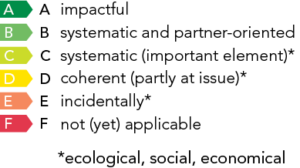The Self-scan for sustainable education is worked out by lecturers of a study programme, under the guidance of a fellow lecturer who prepares and leads this session. This lecturer will prepare a final report with which the conversation within the study programme can be continued.
Various materials have been developed to get started with the Self-scan for sustainable education:
- HU Self-scan for sustainable education Education with Development Stages (see below). A fill-in sheet (A3) with goals and development stages with 4 tabs: coherence between the SDGs (Cake), coherence for education (SDG house), curriculum, students and training.
- Presentation of the Self-scan for sustainable education for the session with the study programme.
- Instruction Self-scan for sustainable education for the facilitators of the session with the study programme.
- Explanation of purpose, background info, different options for your session.
- Reporting format to report to management
- Reporting student surveys SDGs.
A report in PowerBI of the new questions about sustainability in the 100 days monitor of the HU and the HBO monitor. This report can be used to include the expectations of our new students and the experiences of the graduates of the University of Applied Sciences Utrecht in the conversation. Go to: The Self-scan for sustainable education (for students) for the data.
The above-mentioned sections of the Self-scan for sustainable education can be downloaded at the bottom of the page. The documents are only available in Dutch.
For more information on how to participate in the self-scan or for support with implementation, please contact us: duurzaamonderwijs@hu.nl
The stages of development measured with a 6-point scale
In the Self-scan for sustainable education, the progress of sustainability in the programme is built up in 6 stages: from non-applicable (1) to impactful (6), indicated by a letter, as with a sustainability label for a clear and recognisable representation of the results.

A. Impactful
The programme profiles itself on sustainability and the associated social issues, its ambitions in this area reach across borders, and crucial partners recognise that the programme plays an exemplary role in both areas. Together with partners, the programme has a positive impact on the sustainability problems facing society.
All three levels of sustainability are discussed (in conjunction). In all parts of the training.
B. Systematic and partner-oriented
Crucial partners in the field and knowledge institutions work together and are actively involved in the integration and evaluation of sustainability in the study programme, i.e. in the entire PDCA cycle.
All three levels of sustainability are discussed, in conjunction, including how they are connected. In all parts of the programme, AND at crucial partners in the field and knowledge institutions.
C. Systematic (important element)
The topic of sustainability is systematically anchored in the programme. The PDCA cycle is demonstrably complete: the programme evaluates, initiates follow-up activities, and achieves concrete results.
All three levels of sustainability are discussed, in conjunction, including how the perspectives are connected.
In all parts of the programme.
D. Coherent (partly at issue)
The activities related to sustainability form a planned, coherent whole. The related activities are considered as a rule: every student and lecturer pays attention to sustainability in the programme.
All three levels of sustainability are discussed, in conjunction, including how the levels are connected.
Only in certain parts of the programme.
E. Incidentally
Sustainability is incidentally represented in the training and is based on the actions of individuals, these are one-off activities
Not all levels (environmental, social and economic) of sustainability are represented. Or all three levels are discussed, without being aware of the interaction, how the levels can be connected.
F. Not (yet) applicable
Sustainability is missing from the relevant part of the programme.